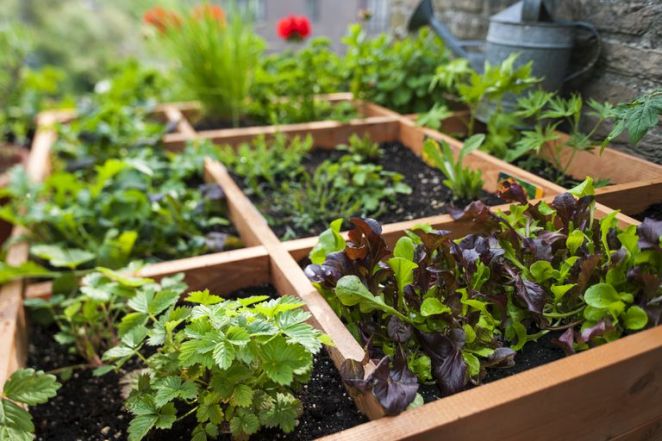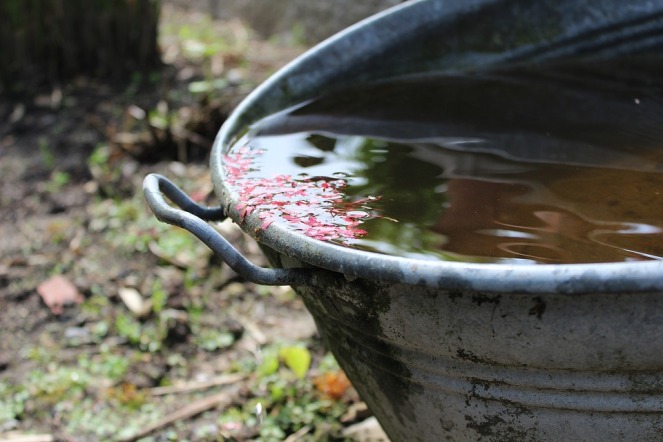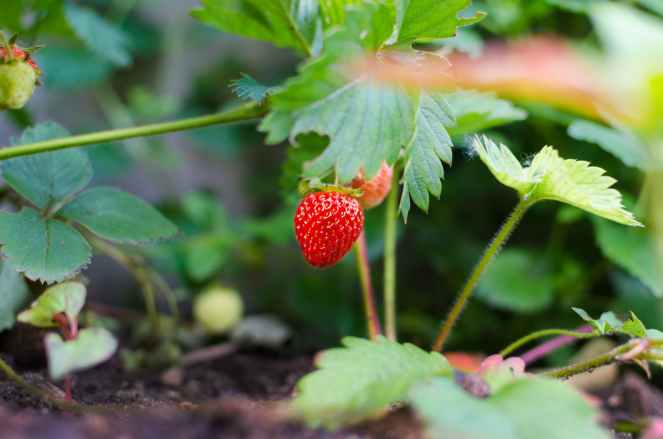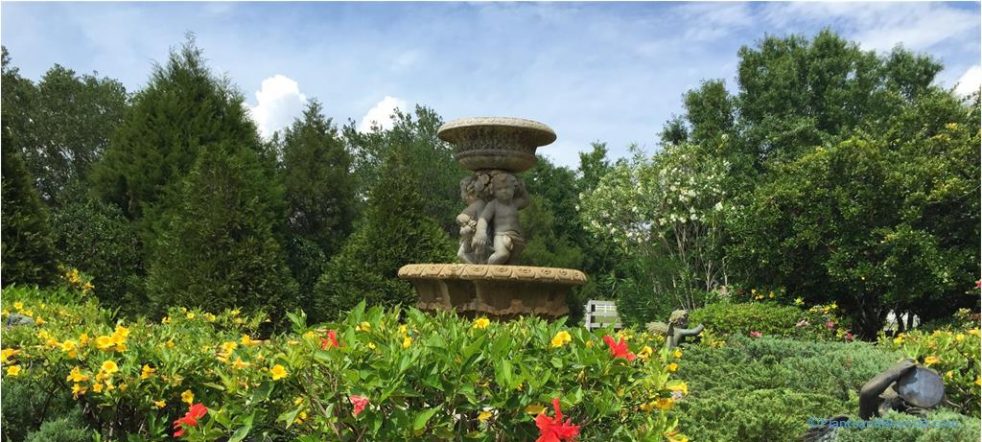~ When we make a decision to grow our own fruit and vegetables, we still have a responsibility to the environment and the ecosystem that surrounds our property. One of the many reasons people chose to grow their own food is to attempt to lessen their carbon footprints on this planet. It is no secret that food production contributes to the depletion of the world’s resource, so much so that it increasingly utilizes vast amounts of our available and valuable water reserves. That is just before you even consider the amount of fossil fuel we use to transport produce from one place to another.

More and more of homeowners chose to grow food in their own backyard to lessen the economic impact, along with preserving natural nutrients that their own land can offer. No matter which way you look at it, homegrown options are by far more preferable to mass-produced produce. It is worth thinking about the following ways that you can lessen your footprint on the environment further, as you grow fruit and vegetables in your own property.

Make your own compost
Many people do not realize that shop – bought fertilizers can contribute to environmental damage. Since they contain inorganic man-made materials, they are super efficient for plants, but as they drain out to the fields, soil effects are not very favorable. Nitrogen is especially problematic when fertilizers contaminate waterways, as it reduces oxygen content. Human carcinogens, environmental pollutants, and toxic waste endanger wildlife, humanity, and nature. Prior to spraying your hard work in the yard, its worth considering what is hiding inside your fertilizer. that’s before you even consider the other nasties you might have not to realize are hiding in your fertilizer. A shocking 29 popular fertilizers tested positive for 22 toxic heavy metals. When you use quick solution store-bought products on your growing plants, the results that you might be consuming are not truly positive, are they? One way to overcome synthetic chemical sprays is by making your own compost. Just think about it: the process of composting can help the environment as it keeps waste out of the landfill. Plus, it means that you will never need to rely on harmful fertilizers again. By investing your time into the organic composting matter, make your own compost bin and saving all the vegetable scraps in your kitchen, truly creates a positive “passing forward” influence on the environment and your own household.

Homemade and natural herbicides
Take a look at this Natural Pesticide video. I find it intriguing, since even I, with over decades of growing edible gardens, never heard of this technique.
Do you guys use this method? If so, please let me know what results you achieved, please.
These natural and do it yourself pesticides that are effective at helping to rid your crops of harmful critters, but safe enough to keep from poisoning you and your family. Instead of contaminating the environment with synthetic options, why not use the natural flower derived prays? Harsh chemicals could result in the fatal diminishing of wildlife and plants. Moreover, your fresh, edible gardening produce will not be as nutritious and beneficial as you envision it to be. Luckily, there are plenty of homemade recipes to protect your plants without damage. Even better, a lot of these use ingredients you’ll already have to hand, like soap, spices, salt, and garlic. With these products always available on hand, as compliments of your own kitchen, it will not be too hard to switch to your own “made with love” products.

Use rain for watering
The amount of water we need to grow fruit and veg for an entire season is quite astounding. The moment Summer months are here, watering twice a day, could be critical for your plant’s progress. Some counties have restrictions of watering in certain hours of the day. To preserve water supply, even sprinkle system that you might invest in to keep your lawn green, might not be allowed to be utilized. How would you react if you are reported to the government for draining local water resources, while you just peacefully tried to nourish your thirsty plants? Sigh. I can not account for my reaction, really, but rainwater that is collected in rain barrels could serve as a big yard helper in the time of need. Rainwater is natural, complementary and does not require filtering. Of course, you will need to make sure that you have to collect rainwater daily and set aside for extra water supplies. As explained by Titan Lite, a constant supply would be even easier to achieve if you installed a wet system in your shed. A wet system connects your downpipes and gutters to a rainwater tank which can be tucked against one side of the shed or in an out of the way place in the backyard. By installing a wet system on your roof and pipework during the building phase, all rainwater can be captured and stored in your tank and then used to water the garden year-round, saving money on your water bill. That way, you could give your vegetable patch the water it needs without having to worry about the lack of water. I learned this as another gardening idea and wanted to pass on to you, guys.

Make it a very green day, my friends.
Luda@PlantsandBeyond🌿
All photographs belong to Luda @PlantsandBeyond.com
©PlantsandBeyond.com
.


Wonderful tips and ideas, thanks!
LikeLiked by 1 person
The text was very informative but the pictures made me smile – lovely!
LikeLiked by 1 person
Thank you dearest Tierney
LikeLiked by 1 person
Great tips, Luda!
LikeLike
As always great tips, fantastic video. So important to create natural products with pets in mind too.
LikeLiked by 1 person
Love and hugs to you, Nanette
LikeLiked by 1 person
SUCH great tips! And lovely way you presented them all, thank you!
LikeLiked by 1 person
What a nice comment, thank you soooo much!
LikeLike
Yes to this, natural is a must.
LikeLiked by 1 person
Thank you for yoru support!!!
LikeLiked by 1 person
My pleasure
LikeLike
I’m so glad you are promoting natural, homemade products, Luda. So many toxins in our environment already. I compost and rarely spray anything. My fertilizer this year is alpaca manure!
LikeLike
Oh, I would not ever spray anything unnatural on my own crops. Why do it at all? Thank you Eilene, for your support, but so very much impressed with Alpaca manure!!! and here I thought that rabbitt poop was the bomb….Such a great idea!
LikeLiked by 1 person
Great tips and ideas, Luda!👍👍
LikeLiked by 1 person
Awww thank you, Richa – so nice to see you
LikeLiked by 1 person
It’s a wonderful informative post Luda.
LikeLiked by 1 person
Thank you dear Rupali
LikeLiked by 1 person
Great tips and the pictures are so inspiring! 💕
LikeLiked by 1 person
❤️❣️🌟❣️
LikeLike
Your post is a great reminder to all gardeners that our gardens can be tended and cared for in a 100% organic approach without resorting to the commercial poisons (pesticides). Thank you, Luda!
LikeLiked by 1 person
Wow, Perfect statement that made me cringe, Peter. yes commercial poisons… if they would be just labeled like that , there would be no market for them. Thank you so much for your comment.
LikeLiked by 1 person
first of all I learned a lot from reading your blog. Second your photos are gorgeous, it’s not easy to produce photo’s of that quality. And lastly, your ideas are brilliant. My father has a small garden on our backyard and we don’t use pesticides, and one time fungus eat all his radish. My father is an agriculturist in the Philippines that’s what he finish in college and that’s what he does for a living. So first time he came here and started gardening her in FL he said the soil is not good so we have to buy soil. Although with all the limitations he manage to set up a small garden in our backyard where we have tomatoes, eggplant, bitter gourd, okra, collard green, calamondin, moringa, papaya, these are the usual fruits and vegetables we consume in the Philippines. We do have good harvest and we also share it to my relatives here. 🙂 I remember in the Philippines we are doing composting, and here now for watering we use rain water, and the water from my fish tank which can be an organic fertilizer 🙂
LikeLiked by 1 person
Wow – you made my day, I am so grateful to you what a kind person you are. It’s fascinating to learn that you can use fish tanks’s water as a fertilizer – see I learned something from you today. Wishing you a wonderful weekend
LikeLiked by 1 person
I actually dont know if I can really use my fish tank water, but that’s what Im doing. Because that water has a lot of nutrients from my fish 😉 🙂 and Im adding ferts too in my water tank
LikeLiked by 1 person
perfect encouragement
& lesson on producing
a wonderful gift of food!
i’ve had success at all 3
of these ways.
due to summer travels
i may not be gardening this year.
still i water the flowers
and smell the roses 🙂
LikeLike